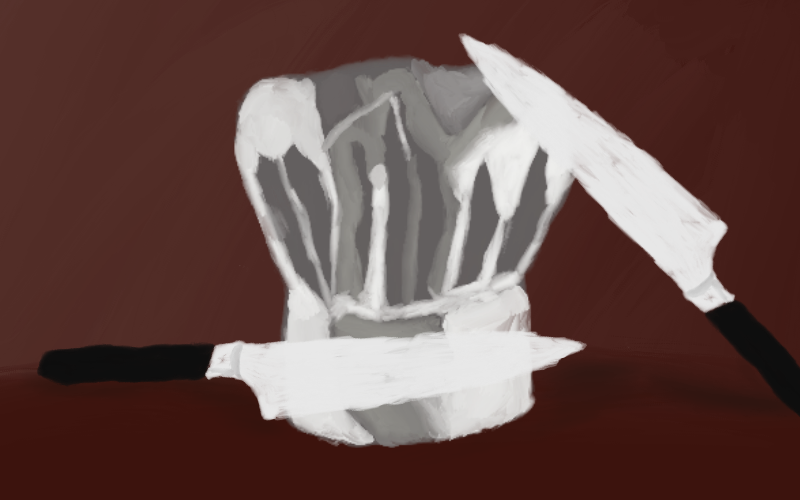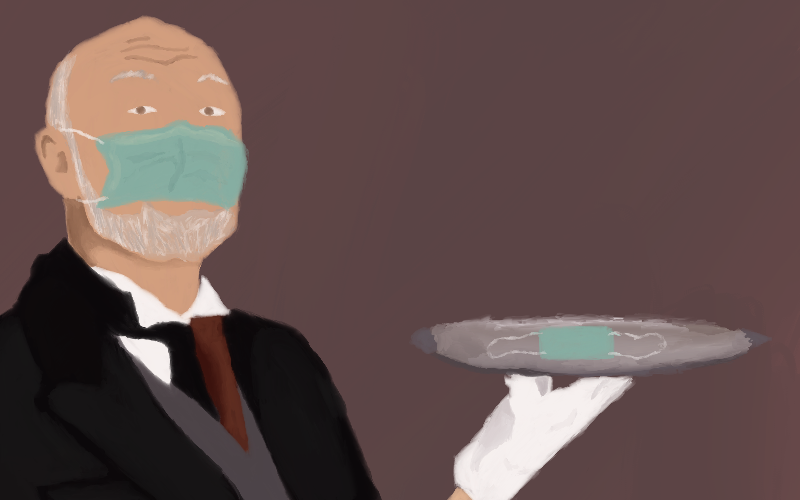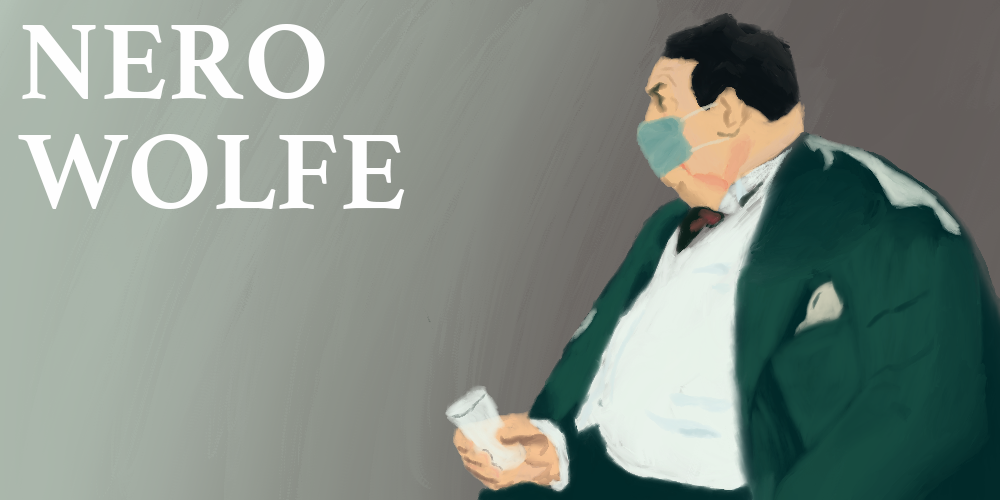I am a fan of Rex Stout’s detective novels. While so much during this pandemic has caused me stress and reinforced a sense of loneliness, these novels are familiar friends who induce calm and joy. I have had them on my shelves for decades, some probably inherited from my father, born in 1925, and wide-ranging and eclectic in his reading. In other words, Stout’s novels exist as a world that connects me to that of my father, who grew up in the New York City many of the novels are set. These books have been particularly comforting during the lockdown both because of this familial connection and because, in the manner of traditional detective fiction, things invariably work out and the murderer is always caught and brought to justice. In a time of chaos and uncertainty, closure and reassurance are welcome. Yet reading Stout’s novels now, in 2021, means that they also raise issues that had never fully registered in previous readings. These issues must be reckoned with in the face of our enlarged awareness of bias on a multitude of fronts.
Rex Stout wrote 33 novels and 39 novellas between 1934 and 1975 (the year of his death). They feature the iconic private detective, Nero Wolfe, and his wise-guy assistant, Archie Goodwin. Wolfe is an eccentric whale of a man (one-seventh of a ton, Stout tells us, though sometimes, it’s one-sixth). Wolfe’s “fatness” is an ongoing motif in the novels; he revels in food and has no shame about his weight, being particularly attached to a custom-made chair designed to accommodate his bulk. He rarely leaves his Manhattan brownstone on 454 W. 35th Street (though sometimes it’s 922 W. 35th, which would put it in the Hudson River). Wolfe spends his day eating gourmet meals prepared by his gifted personal chef and allots four hours — from 9-11 in the morning and 4-6 in the afternoon — visiting the rooftop greenhouse of his building, tending to his orchid collection. In between, he sits behind his desk reading arcane books, drinking beer, and reluctantly solving murders in order to pay the bills.
Wolfe’s life is a wish-fulfillment for the pandemic. Lock-down would be far more palatable if one had a gourmet chef, an orchid collection, and an energetic amanuensis (OK, I have a husband, but he is only sporadically energetic).
Wolfe’s genius at solving crime recalls the deductive power of Sherlock Holmes. But the novels are set in New York City, not London, and Wolfe, unlike Holmes, is stubbornly sedentary, while Archie, unlike Dr. Watson, serves his boss through strenuous legwork. This is a division of labor that is made explicit in the series. As Archie explains of his boss: “He hated things that moved, and was fond of arguing that nine times out of ten the places that people were on their way to were no improvement whatever on those they were coming from.”
I should add that, unlike the relatively passive Dr. Watson, Archie is active to a fault — charged with searching for evidence and bringing in suspects, through any means necessary, to be interrogated in Wolfe’s office. Along the way, he ends up punching nasty men and kissing beautiful women (sometimes to shock them out of a hysterical fit). The latter behavior gives the novels a decidedly sexist coloration, especially when one adds Wolfe’s pronounced distaste for women, whom he finds irritatingly emotional and irrational.
And here is where the problem begins, amplified by other elements that came dramatically to my attention in a recent re-reading of Too Many Cooks, the fifth of the Nero Wolfe mysteries.

Too Many Cooks is considered a masterpiece by Stout aficionados. Most of the action takes place at a West Virginia spa (clearly modeled on the famed Greenbrier resort) where Wolfe has been enticed to leave his brownstone in order to serve as guest of honor at an event for an elite group of international chefs. A murder occurs, of course, which Wolfe, with Archie’s aid, must solve.
The problem is that the book was written in 1938 and partakes of the prejudices of its day, which include, as with most of the Nero Wolfe books, references by Archie to women’s eyes, skin texture, profiles, legs, and various curves. Yes, Archie is clever, hard-working, and a good dancer, but he is the objectifying male gaze par excellence. Some examples, chosen at random:
Her skin was so smooth that the frown was like a ripple on a new tennis ball.
[T]he view upward from a well-shaped foot and a custom-built ankle was as satisfactory as any I had ever seen.
From the back her neck looked a little scrawny, but when she turned to us she had smooth white skin and promising blue eyes.
Alongside such sexist comments are racist ones. Archie refers to “dagos” and “pollacks,” and there is a running reference in all the novels to Jewish operative, Saul Panzer’s “big nose.” In Too Many Cooks, Archie also remarks of the Chinese wife of one of the famous chefs:
[She was] a short and slender black-eyed affair who might have been anything under 35 to my limited experience, because she was Chinese. To my surprise, when I had met her at lunch, she had looked dainty and mysterious, just like the geisha propaganda pictures.
Finally, and most disturbingly, both the sheriff and the district attorney brought in on the murder use the n-word liberally.
And yet the book also contains one scene that addresses racism with exceptional sensitivity and power. It occurs about three-quarters of the way into the narrative. The waiters at the West Virginia resort are all Black men who wear the livery of the establishment while on duty. The murderer, we have already learned, wore this garb and blackface — burnt cork — in an apparent effort to disguise himself during the murder. Wolfe holds a meeting of the waiters in his hotel room at night, having learned from the Chinese wife of the celebrity chef that a waiter glimpsed a stranger in the kitchen before the stabbing.
Both the wife and the waiter did not report what they saw to the police because they were reticent to come forward: “You see, I’m afraid. The police don’t like the Chinese, and I am a Chinese woman,” says the chef’s wife. “I’ve learned not to mix up in the affairs of the superior race,” says the young Black waiter (a phrasing that he clearly means to be ironic given his later comments in this scene). Such statements reveal Stout’s awareness of the inequity and abuse suffered by minorities in the period of Jim Crow and segregation in which this novel was written.
But the most powerful moments in the novel occur when Wolfe queries the young waiter as follows:
“Mr. Whipple. I know you, of course. You are an alert and efficient waiter. You anticipated my wants at dinner. You seem young to have developed such competence. How old are you?”
The muscular kid with the flat nose looked straight at Wolfe and said, “I’m twenty-one.”
Moulton, the headwater, gave him an eye and told him, “Say sir.” Then turned to Wolfe: “Paul’s a college boy.”
“I see. What college, Mr. Whipple?”
“Howard University. Sir.”
Wolfe wiggled a finger. “If you feel rebellious about the sir, dispense with it. Enforced courtesy is worse than none. You are at college for culture?”
“I’m interested in anthropology.”
“Indeed. I have met Franz Boas, and have his books autographed. You were, I remember, present on Tuesday evening.”
A bit later in the conversation, when the young waiter expresses veiled contempt for Wolfe’s preoccupation with gourmet food, there is another interesting exchange:
“Your tone suggests disapproval.” [says Wolfe].
“Yes, sir. If you ask me. It’s frivolous and childish for mature men to waste their time and talent, and other people’s time—”
“Shut up, Paul.” It was Moulton [the headwaiter].
Wolfe said, “You’re young, Mr. Whipple. Besides, each of us has his special set of values, and if you expect me to respect yours you must respect mine. Also I remind you that Paul Lawrence Dunbar said ‘the best thing a ’possum ever does is fill an empty belly.”’
The college boy looked at him in surprise. “Do you know Dunbar?”
“Certainly. I am not a barbarian.”
Note that throughout this exchange, Wolfe, unlike other white characters, uses “Mr.” and not the waiter’s first name and that he is versed in and respectful of Black literary culture.
In the course of this exchange, Wolfe also espouses racial equality: “The ideal human agreement is one in which distinctions of race and color and religion are totally disregarded; anyone helping to preserve those distinctions is postponing that ideal.” Indeed, Wolfe never impugns a minority group himself and always refers to the waiter as “Mr.” where no other character does.
But despite Wolfe’s ability to articulate the idea that racial inequality is unfair and to treat the Black waiters with respect, he nonetheless makes clear that his interrogation has one goal: to get information out of the waiters about the murder. His ability to see the humanity of the young waiter and to relate to him so effectively is, as he admits, opportunistic. There is nothing in his behavior toward the other, racist characters that seek to question, no less change, their attitudes or behavior. (For what it’s worth, the character of Paul Whipple, the young Black waiter in Too Many Cooks appears again, 26 years later, in A Right to Die. Mr. Whipple, now Dr. Whipple, is, significantly, one of the few characters that Stout returns to. He is now a middle-aged academic who has come to consult Wolfe about his son in another racially inflected plot that would require another essay to parse.)
So here are my questions: Does Wolfe’s interaction in this scene salvage the novel from its otherwise casual racism? Should we discard the novel for this casual racism, despite this illuminating scene — and despite its wonderful twists and turns, its delightful descriptions of food, and Wolfe’s glorious speech on American cuisine at the final banquet? (In that speech, he praises the fine taste of American pork as the result of pigs fed with peanuts, and of American chicken as the result of chickens fed with blueberries. Admittedly, this speech may go down less well if one has become, as I have, a vegetarian.)
I would like to assign this novel to my undergraduate students for its crisp and clever writing as well as for the scene I cited above, but am worried about doing so. Will they find its context difficult to grasp and its language offensive, even if I make efforts to explain it? Will the lightness of tone diminish the important lessons that the novel contains, both deliberate and despite itself, in its reflection of the race situation of its time? By the same token, will my focus on bias and bigotry destroy what was written to be light entertainment, representative of the best of its genre? In short, is this work inextricably tainted by the injustice of its age and, therefore, in some sense, unredeemable?
I turn to Rex Stout’s biography for help and see a man of apparent rectitude, even heroism. Stout was as engaged with life as the fictional Wolfe was disengaged. He joined the Navy prior to World War I, organized The Writers’ War Board during World War II, advocated for copyright laws and against censorship, was an early and active member of the Civil Liberties Union and champion of the United Nations. As an opponent of Charles Lindbergh, whom he excoriated for his bigoted ideas, he was attacked by the America First Committee. He was also profoundly critical of J. Edgar Hoover, whom he makes a target of his 1965 The Doorbell Rang. He was a New Deal Democrat but also an ardent anti-Communist. He opposed extremism on both the right and the left and is famously quoted as telling Martin Dies, the chairman of the House Committee on Un-American Activities: “I hate Communists as much as you do, Martin, but there’s one difference between us. I know what a Communist is and you don’t.” He was not an ideologue but a patriot, a thinker, and a master storyteller.
But he was also a man of his time and created books that both combatted some of the worst elements of the culture in which he lived while assimilating other elements without question.
I should add that my singling out of Rex Stout’s detective novels may seem arbitrary to some readers, given that so much of the western canon is permeated with bias of one sort another. It is impossible to read such revered canonical authors as Charles Dickens, Henry James, Edith Wharton, Virginia Woolf, and F. Scott Fitzgerald without being struck now by cringeworthy allusions to marginal groups. When I was in graduate school in the late 1970s and early ‘80s, we didn’t make anything of this. The academic response was to politely ignore such infractions. As a Jew, writing my dissertation on Henry James, I remember wincing as I read his autobiography, The American Scene in which he alludes with distaste to the fact that Jews have overrun the Lower East Side of Manhattan. One was expected to say nothing. But when I taught a course on James’s ghost stories this fall, an African-American member of the class pointed out the reference to a servant as a “negress” — and we proceeded to spend a long and productive conversation on the conceptual use of this character as a background figure in the story. The discussion ended up enriching rather than diminishing our understanding of James and his world. I will continue to read and study James while also being aware of his limitations and biases.
I think the same can result from a close and critical reading of Rex Stout. His novels are brilliant examples of the detective genre at its most crisp and original. I should note that introductions to his novels have been written by Black artists, including the great crime-writer, Walter Mosley.

I read these books to escape from the world as it exists, and yet the books are of the world in which they were written and hence cast light on our own as having inherited much from that world. I am lulled by these wonderfully imaginative works until something in the writing jars and I am made conscious of the inequities of the past that continue, in some form, into the present. Being jolted out of complacency is not entirely outside the mission of a good detective novel. •




